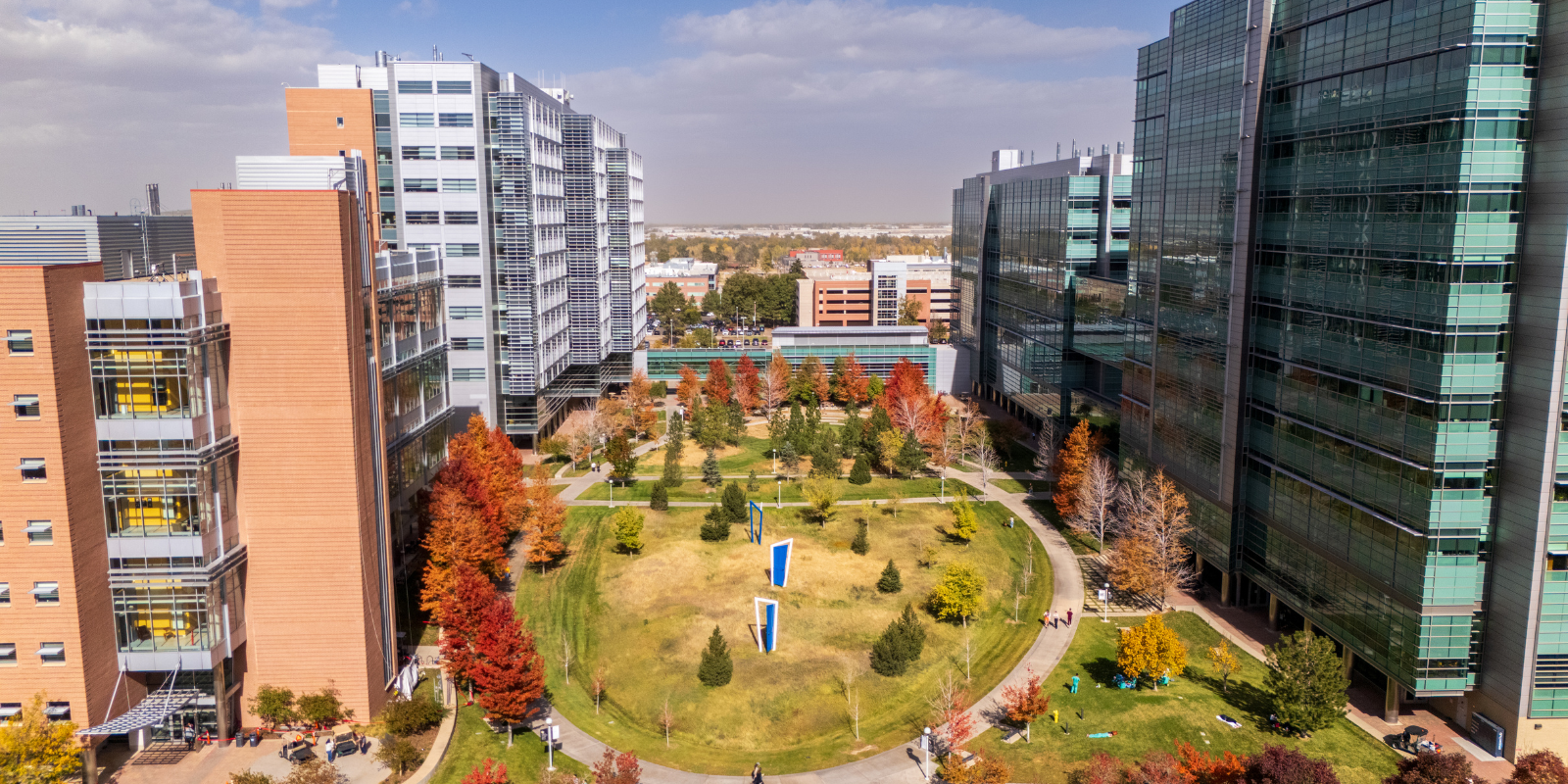Immunologists from the University of Colorado School of Medicine this week expressed confidence in the COVID-19 vaccines and encouraged people to get vaccinations when they become available. They also addressed frequently asked questions about how the vaccines work, why they have confidence in the process that created the vaccines, and who should get the shots.
Three of the immunologists said they participated in clinical trials this summer.
“It’s been valuable for people to hear me say, ‘I was in a phase 3 clinical trial,’” said Ross Kedl, PhD, professor of immunology and microbiology. “There’s a street cred that comes with that. They don’t just see me as a vaccine person telling everybody else that it’s fine.
“I think we can say that our personal experience with the clinical trials has only increased our confidence in the impact these vaccines will have on our society and creating long-lived immunity to the coronavirus.”
Joining Kedl to answer questions were John Cambier, PhD, distinguished professor of immunology and microbiology; Rosemary Rochford, PhD, professor of immunology and microbiology; and Elena Hsieh, MD, assistant professor of pediatrics, Section of Allergy and Immunology. All are conducting research on immunity to COVID-19 in their laboratories.
Since the authorization of the vaccine was rushed, how can we be sure it is safe?
- Rochford: I would not say it was rushed. I would say it was expedited. They put all their time and energy into reviewing it. Normally, this is a process where you have the review of the vaccine data competing with many other duties, but in this case, they made the review a top priority.
- Kedl: That’s a good way of saying it. The authorization was expedited, but the safety was not compromised. The FDA’s rules for how they would evaluate safety were posted long before any approval of the vaccine was done to provide comfort that it wasn’t unduly influenced.
- Hsieh: I work in the allergy and immunology clinic, so we get a million questions about vaccines in general, but more so about this vaccine. They say the process for this vaccine has been faster than any other one. True, but also there have been more resources invested into making this vaccine than any other one. Making a vaccine is science, it is experiments, it is trial and error. It requires a lot of resources, and if you get more money, you can get more done quickly.
- Kedl: What it is compared to is the mumps vaccine, which was done in four years in the 1960s. And if you ask the question, "What else has gotten faster since the mumps vaccine?" you would come up with a pretty long list. Circumnavigating the globe is pretty quick these days compared to back then as well. Broadly speaking, the idea is that science builds on itself, it progresses more quickly as time moves on. Lots of things have gotten faster since the previous fastest vaccine. It’s possible to do all those things faster without sacrificing safety.
Will the vaccine give me COVID?
- Rochford: No.
- Kedl: None of the vaccines encode the capacity to make a coronavirus. They encode a simple, single coat protein from it, and you can’t make a whole virus out of one coat protein.
- Rochford: Another way to say this is that the vaccine just has the critical part of the virus that the virus uses to get inside the cell. By including that critical part, you’re going to make antibodies to only a bit of the virus, but the vaccine doesn’t have any of the rest of the virus. The vaccine is designed to block the key the virus uses to get inside the lock of the cell.
I’ve previously tested positive for COVID-19. Do I need to get vaccinated?
- Cambier: Yes. We don’t know how much antibody or immunity it will take to protect us against COVID. What we do know is that the amount of antibodies made after an infection in general are much less than the amount of antibodies that are made after a vaccination.
- Kedl: I would say the answer is "eventually yes." The rationale is that the responses to COVID range pretty significantly in terms of immunity post-recovery from COVID. Since we don’t know exactly why the responses range so much, you would rather have your immunity brought to a significantly higher standard. That’s exactly what the vaccine does.
- Rochford: When you get an infection with the virus, your body is doing all the things it can do to fight the virus. It’s trying to fight all the parts of the virus because it doesn’t know which is the important one. As a result, you might not have made the best antibody response to the virus. When you give somebody a vaccine, all their body has to do is deal with this vaccine, and doing that helps you make a more effective immune response. That’s the only thing your immune system has to do, is make good antibodies.
I’ve heard that the antibodies to the virus don’t last, so why would a vaccine work any better?
- Cambier: In addition to the previous answer, there’s immunological memory. Even though the antibodies may go away, the immune system makes special long-lived memory cells that can be rapidly recalled if it encounters the virus again.
- Kedl: I also think we should counter that first assumption – that the antibodies don’t last. The data is fairly clear now. For the vast majority of people, the antibodies do indeed last. I don’t think that’s in dispute anymore. Antibodies always eventually wane over longer periods of time, hence we need boosters. Broadly speaking, the virus-specific antibodies in people who have been infected hold fairly steady. It’s only been a handful of months, but the best data I’ve seen shows that they’re not dropping for the vast majority of people.
- Hsieh: The idea of needing boosters for vaccines is true for so many other vaccines we currently have. I was thinking about all the childhood vaccines. You get them at two months, four months, six months, because you need them, because you need to boost the response over and over again. You need to develop that memory response.
Why do I need a second injection of this vaccine?
- Rochford: You’re training your immune system. You’re tightening it up. You’re fighting off someone in the arena. The first time you see it, you realize you can land a left punch but not a right punch. But when you see that same guy again, you’ve got a better understanding of ways to punch and hit, so you train your immune system cells to fight better. And more specifically to target the virus spot on.
- Kedl: Everything gets better with practice.
Why does the vaccine make some people feel sick?
- Cambier: This is a really important one. People who hear about symptoms think, "Oh, they gave me the virus," which couldn’t be further from the truth. In addition to the mRNA encoding a piece of the virus, the vaccine contains a substance called an adjuvant that stimulates the immune system non-specifically. This is what makes you feel bad.
- Kedl: The reality is when you’re sick with an infection, the reason you feel sick is your immune response. That’s mostly why you feel ill. That’s a sign that your immune response is doing what it needs to do. When you get an injection and you feel like you have flu-like symptoms, all that is is a sign that you have adequately, robustly motivated your immunity. In a vaccine context, that kind of side effect should be reassuring. It may not be convenient, but it’s reassuring. In an infectious setting, all that means is that something’s coming and who knows what it is. In a vaccine, what’s coming is immunity.
- Rochford: What you do when you design a vaccine is you have something to tickle the immune system to say, "Hey, there’s trouble here." That’s what we call the adjuvant. It’s like waving the red flag toward the bull.
- Kedl: Vaccines all contain adjuvants. The adjuvant component isn’t the part that the immune response targets for long-term immunity. It’s the part that wakes the system up into paying attention to it, so that the system actually goes forward with making an immune response and eventual long-term memory. That’s a good word to get in here: Adjuvant. It’s not a dangerous word, it’s actually a good thing. It’s derived from a Latin word that means "to help."
If I’ve had allergic reactions to flu vaccines, will I have an allergic reaction to this vaccine?
- Cambier: No. The allergy to flu vaccines is caused by immunity to egg proteins. Flu vaccines are made by growing the flu virus in eggs, and as a result egg proteins contaminate the vaccine.
- Hsieh: No.
- Kedl: None of the current vaccines for COVID are grown in eggs at all.
How does an mRNA vaccine work? Is it reprogramming all our cells?
- Rochford: No. It’s the messenger RNA, also known as mRNA. DNA makes messenger RNA, and then you make proteins based on the mRNA template, so the mRNA is just there to make the protein part of the virus inside of the cell. It can’t go backwards to make DNA. It can only go in one direction. They call it the information highway of our cells and it only goes in the direction of making proteins. All it’s doing is using your cell as the factory rather than using eggs, or other things, as the factory.
- Cambier: And it’s a temporary thing. These mRNAs degrade with no permanent effect on the cell.
- Kedl: They’re lost over time. You’ve only temporarily turned an individual into their own vaccine factory, instead of making it ahead of time and dealing with the hassles. The RNA codes for the vaccine production inside the individual’s arm, and you turn them into their own vaccine factory.
It’s the ultimate biohacking. A virus gets into your cells and uses them as a factory. This vaccine method does the same thing, but without the infection at all. So you miss infection, but you utilize the very potent mechanisms that evolution has created over time for us to create this kind of immunity. I think that’s one of the reasons why it’s so potent. It biohacks its way into the viral immunity pathway, but without any infectious process.
Should I wait to see whether this vaccine is safe for other people?
- Cambier: Isn’t the experience of 40,000 people in a clinical trial enough?
- Rochford: Three of us [John, Ross, and Rosemary] have all been in a clinical trial and we happily, willingly volunteered to be part of it.
- Kedl: There is still some question for people who have really strong atopy, if they are really allergic individuals. All we know is that two individuals in Great Britain had an anaphylactic response. There are reasons to believe that’s not going to be broadly a problem, but that said, the data is not in on it. I think it’s fair to tell people that it’s worth looking at the clinical trials to know exactly what groups of people were immunized. There were groups of people who were not included. Like in this case, if you’ve had serious anaphylactic responses, you were not allowed to participate in these trials, so the data is not in on that yet.
What do you say when people ask about vaccinating their kids?
- Hsieh: We’ve had lots of questions, and the answer we’re providing right now is that we don’t have studies about vaccination in children yet. It’s not approved for use in children yet, and therefore we do not have guidelines for any child in general, nor a child with a specific disorder that puts them at more risk for infection, nor for the parent of the child.
If I get one company’s vaccine and then get another company’s vaccine, is that going to cause a problem?
- Rochford: No. They’re all using the same bit of virus. All these companies, they’re all targeting the same thing because the science said, "This is the part of the virus that you need to make an antibody to be protected from the virus." Pfizer said, "OK, we’re going to put the virus bit in this vehicle." Moderna said, "We’re going to do it this way." J&J this way. AstraZeneca this way. But they’re all putting in the same bit of the virus. Getting one vaccine and then getting a second one is called a "heterologous" (meaning "first one, then another") prime boost. It should be perfectly good to give it one way and then another way.
Is the vaccine safe if I have immune system issues?
- Kedl: It depends on what the immune system issues are. That’s a big category. I think you can split people into a couple of categories that they can understand. A lot of people have the question, "I have autoimmunity; can I take vaccines?" For those people, who have things like SLE (systemic lupus erythematosus), or RA (rheumatoid arthritis), the data broadly shows that vaccines do not worsen their condition. In many cases, depending on the vaccine, it’s subtle, but in many cases their condition will often improve. There’s no evidence that being vaccinated if you have an autoimmune condition makes it worse.
The second category is, what if you are on an immunosuppressant? It depends on which one it is, but I would generally say there is no evidence that if you are on an immunosuppressant that the vaccine will harm you in some way. You may have a reduced immune response relative to other people. That’s entirely possible, depending on what the immunosuppression is. It’s not necessarily contraindicated to get the vaccine. It’s just that it may not be as successful in you as it may be in other people. - Cambier: I got this question from someone who is being treated with steroids for RA, and I agree, the vaccine is not going to hurt them. Take it.
- Hsieh: My typical response to this question is that if you have an autoimmune disorder, you could argue that your immune system is more likely to get triggered by an immune stimulus than a person who does not have an autoimmune disorder. The vaccine is a "light" immune stimulus, designed to activate an immune response, and it could possibly but unlikely trigger a flare. The infection, on the other hand, is a robust stimulus and it will certainly activate your immune system, and more likely trigger a flare.



